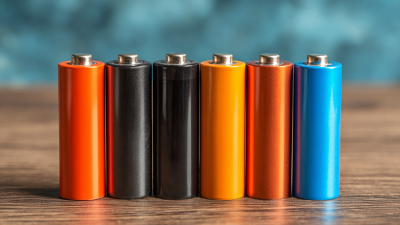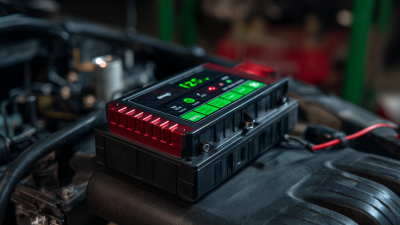How to Choose the Right Charging Power Station for Your Needs
Table of Contents
- Understanding Your Power Requirements: Key Considerations
- Types of Charging Power Stations: A Comparative Overview
- Portability vs. Capacity: Finding the Right Balance
- Features to Look For: Smart Technology and Connectivity Options
- Budgeting for Your Needs: Cost-Effective Choices
- Brand Reputation and Reliability: Making an Informed Decision
- FAQS
- Conclusion
- Related Posts
As the demand for renewable energy solutions continues to rise, the importance of selecting the right Charging Power Stations cannot be overstated. According to recent industry reports, the global market for portable power stations is projected to reach approximately $1.5 billion by 2027, driven by the increasing need for reliable energy sources in outdoor recreational activities and emergency power supply. Roofer Electronics Technology (Shanwei) Co., Ltd., with over 27 years of expertise in R&D, manufacturing, and solution services for lithium batteries and energy storage systems, offers a comprehensive range of products tailored to meet diverse consumer needs. From household energy storage systems to electric bicycles and power tools, Roofer’s innovative battery solutions are designed to enhance the efficiency and performance of Charging Power Stations, ensuring users can make informed decisions when choosing the best options to meet their energy requirements.

Understanding Your Power Requirements: Key Considerations
When selecting a charging power station, understanding your power requirements is crucial. Start by assessing the devices you plan to charge. Consider the voltage and wattage specifications of these devices, as they will dictate the output needed from the power station. For instance, smartphones typically require lower power, while laptops or electric bikes demand higher output. Calculating the total power consumption of all devices used simultaneously will help ensure the station can handle your needs without any interruptions.

Another important consideration is the charging speed. Look for a power station that offers fast charging options, particularly if you have multiple devices. Features such as multiple USB ports and AC outlets can enhance versatility, allowing several devices to charge at once. Additionally, considering the station's portability might be beneficial if you travel frequently. A balance between power capacity and size will ensure that the charging station is both functional and convenient for your lifestyle.
Types of Charging Power Stations: A Comparative Overview
When selecting a charging power station, understanding the various types available is crucial to meeting your specific needs. One common category is portable power stations, which are designed for outdoor use and can charge multiple devices simultaneously. These stations typically feature built-in battery packs that can power small appliances, laptops, and even some power tools, making them ideal for camping trips or emergency backup power at home.
Another type is fast chargers, which are often used for electric vehicles and high-capacity devices. These power stations provide rapid charging capabilities, allowing users to recharge their devices in a fraction of the time compared to regular chargers. They are equipped with higher voltage outputs and advanced technology such as smart charging, which optimizes the charging process based on the device’s requirements.
Finally, solar-powered charging stations have gained popularity due to their eco-friendliness and independence from the grid. By harnessing solar energy, these stations offer a sustainable solution for remote locations where traditional power sources may be unavailable.
Portability vs. Capacity: Finding the Right Balance
When selecting a charging power station, one must carefully consider the trade-off between portability and capacity. Portability is a crucial factor for outdoor enthusiasts and travelers. A report from the National Renewable Energy Laboratory indicates that lightweight power stations—typically weighing under 5 pounds—are becoming increasingly popular for their ease of transport. Such units, while convenient for on-the-go usage, may offer lower storage capacity, often ranging from 150Wh to 300Wh. This is usually sufficient for charging devices like smartphones, tablets, or even small laptops, making them ideal for short trips or weekend getaways.
On the other hand, larger power stations—those with capacities exceeding 500Wh—are designed to meet more extensive energy needs but at the cost of increased weight and bulkiness. According to a study by Energy Storage Association, these heavier units can power small appliances and multiple devices, making them suitable for camping trips or extended outages. However, the loss in portability can be a deal-breaker for many potential users. Striking the right balance between size and power output is essential, ensuring that the chosen charging station not only meets immediate needs but also aligns with your long-term usage scenarios.
How to Choose the Right Charging Power Station for Your Needs - Portability vs. Capacity: Finding the Right Balance
| Model | Portability (Weight) | Capacity (Wh) | Number of Outlets | Charging Time (Hours) | Price ($) |
|---|---|---|---|---|---|
| Model A | 3 lbs | 250 Wh | 2 | 5 | 150 |
| Model B | 5 lbs | 500 Wh | 4 | 8 | 300 |
| Model C | 4 lbs | 300 Wh | 3 | 6 | 200 |
| Model D | 10 lbs | 1000 Wh | 6 | 12 | 500 |
Features to Look For: Smart Technology and Connectivity Options
 When selecting the right charging power station for your needs, it’s essential to consider the smart technology and connectivity options available. Modern power stations offer features like Wi-Fi connectivity and smartphone apps that allow you to monitor usage, control output, and receive notifications. This capability not only enhances convenience but also enables more efficient power management, allowing you to track energy consumption and adjust settings remotely.
When selecting the right charging power station for your needs, it’s essential to consider the smart technology and connectivity options available. Modern power stations offer features like Wi-Fi connectivity and smartphone apps that allow you to monitor usage, control output, and receive notifications. This capability not only enhances convenience but also enables more efficient power management, allowing you to track energy consumption and adjust settings remotely.
Additionally, look for power stations that are compatible with smart home systems. Integration with platforms such as Amazon Alexa or Google Assistant can streamline your charging experience, enabling voice commands to manage your devices effortlessly.
Moreover, consider the number and type of ports available; a station with USB-C, USB-A, and standard AC outlets enhances versatility, ensuring you can charge multiple devices simultaneously without hassle. Prioritizing these features will ensure that your charging power station meets your specific needs while keeping your devices powered and ready to go.
Budgeting for Your Needs: Cost-Effective Choices
When selecting a charging power station, budgeting is a crucial factor that significantly impacts your choices. First, consider the features you need. More advanced stations may offer faster charging or additional ports but come with higher costs. It’s essential to identify your priorities—whether you need multiple outputs for family trips or a basic option for personal use. Establishing a clear budget helps narrow down your options without overspending on features that may be unnecessary for your particular requirements.
Another cost-effective strategy is to compare different brands and models. Prices can vary significantly across manufacturers, so it's worth researching to find a station that provides good value for money. Look for sales and discounts, especially during holiday seasons, which can lead to substantial savings. Additionally, read customer reviews to gauge performance and reliability, ensuring that even with a tight budget, you are investing in a quality product that meets your charging needs effectively.
Brand Reputation and Reliability: Making an Informed Decision
When selecting a charging power station, brand reputation and reliability play critical roles in making an informed decision. A well-established brand typically indicates a history of quality and performance, which can greatly reduce the risks associated with purchasing. Look for brands that have received positive reviews from users and have a strong presence in the market. Researching customer feedback on various platforms can provide valuable insights into the longevity and effectiveness of the product, ensuring you choose a station that meets your needs.
Additionally, consider the warranty and customer support offered by the brand. A reliable manufacturer should provide a reasonable warranty period, which reflects their confidence in the product's durability. Accessible customer service can be a lifesaver if any issues arise post-purchase, making the overall experience smoother. By prioritizing brands that boast a solid reputation and reliable customer support, you are more likely to invest in a charging power station that effectively addresses your power needs while providing peace of mind.
FAQS
: Portable power stations are designed for outdoor use and can charge multiple devices simultaneously, making them ideal for camping trips or as emergency backup power at home.
Fast chargers provide rapid charging capabilities, allowing users to recharge their devices significantly faster than regular chargers, thanks to higher voltage outputs and smart charging technology.
Solar-powered charging stations are eco-friendly and provide a sustainable charging solution by harnessing solar energy, making them ideal for remote locations without traditional power sources.
Portability is crucial for outdoor enthusiasts. Lightweight stations (under 5 pounds) are easier to transport but may have lower capacity, suitable for short trips.
Lightweight power stations typically range from 150Wh to 300Wh, while larger units exceed 500Wh, designed to meet extensive energy needs but are bulkier.
Users should prioritize features they need, set a clear budget to avoid overspending, compare different brands for good value, and look for sales or discounts.
Customer reviews help gauge performance and reliability, ensuring that even on a tight budget, users invest in a quality product that effectively meets their charging needs.
The trade-off involves balancing the ease of transport of lightweight units against the higher capacity and energy output of larger, bulkier stations suitable for extensive usage.
More advanced charging stations may offer features like faster charging or additional ports, but these come at a higher cost, so it's essential to determine what features are truly necessary.
Users often struggle to find the right balance between size and power output, ensuring the charging station meets immediate needs while aligning with long-term usage scenarios.
Conclusion
When selecting the right Charging Power Stations, it's crucial to understand your specific power requirements and compare the various types available in the market. Consider aspects such as portability versus capacity, as finding the right balance can significantly impact your usage experience. Additionally, features like smart technology and connectivity options can enhance the functionality of these stations, making them more versatile.
Budgeting effectively is also important, as there are cost-effective choices that don’t compromise on quality. Lastly, evaluating brand reputation and reliability can aid in making an informed decision. With over 27 years of experience in lithium batteries and energy storage solutions, Roofer Electronics Technology (Shanwei) Co., Ltd. offers expertise in this field, ensuring you choose the best Charging Power Stations tailored to your needs.
Related Posts
-

Ultimate Guide to Understanding Lifepo4 Battery Cell Technology and Its Benefits for Modern Energy Solutions
-

Leading Global Manufacturer: Explore the Best 3.2v 100ah Lifepo4 Battery Cells Available Today
-

Unlocking Energy Independence: The Top Advantages of Powerwall Battery Systems for Homeowners
-

What Are the Key Benefits of Using 12V Lithium Ion Batteries in Your Devices?
-

How to Choose the Right Lithium Battery for Your Specific Needs
-

How to Extend the Lifespan of Your 36v Lithium Battery: Tips and Tricks
Blog Tags:





 business@roofer.cn
business@roofer.cn +86 13502883088
+86 13502883088






